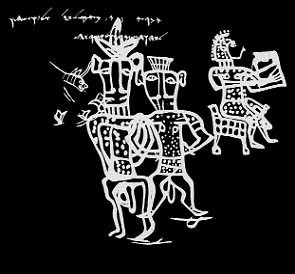 They reported on it on Nazi Palestinian Radio (NPR) and the Bolshevik Broadcasting Company (BBC). Its name was whispered beside water coolers from the big fat apple to frisco, and they couldn't shut up about it on that boob tube. Lips everywhere uttered the name of this place, this new wonderland, some sort of pardes (from which the word 'paradise' is derived from). For it was only months before that it magically appeared ‘yesh m’eyn’, something from nothing. Yet they said that millions had already entered into this mysterious realm with the utterly stupid and unsexy name of 'blogosphere'.
They reported on it on Nazi Palestinian Radio (NPR) and the Bolshevik Broadcasting Company (BBC). Its name was whispered beside water coolers from the big fat apple to frisco, and they couldn't shut up about it on that boob tube. Lips everywhere uttered the name of this place, this new wonderland, some sort of pardes (from which the word 'paradise' is derived from). For it was only months before that it magically appeared ‘yesh m’eyn’, something from nothing. Yet they said that millions had already entered into this mysterious realm with the utterly stupid and unsexy name of 'blogosphere'. Then around Hannuka time, I myself passed through the gates of the mythical pardes, leaving the darkness of the winter solstice behind.
And what an amazing discovery this was…this alluring vineyard of ideas, gleaming sweet fruits, pearls of wisdom and originality hanging heavy off the fragrant vines. And so many souls, once caged, now liberated (mostly from Veelimzboorg. Mahnsee, Bodo Pahk and Flahtboosh) leaping jauntily from blog to blog.
Awe struck and wide eyed I proceeded deeper, but not before pausing at a small clearing to plant my own vine.
I named it. And it even flourished for a while. I too felt liberated, and I don’t even come from the cluster of oh-so-holy towns mentioned above.
Excitedly, I watered my vine with my own two shekels, hoping someone would care and share. A few actually did come to visit and pick the fruit of my vine, but not as many as I had hoped. I knew these things take time, but still, I’m an impatient Jew, quick to lose steam. And there were so many other impressive vines in full bloom with so many devoted visitors, leaving mine easy to ignore. After all, what’s the point of painting a painting if no one stops to gaze if not admire? Why write a book if it’s destined to remain unread, shut on a darkened shelf? The challenge seemed almost insurmountable
So, like many other disillusioned bloggers, I abandoned my vine in the depths of winter, with a silent, guilty promise to return one day. yet from a distance, I noticed that some curious souls managed to stumble upon my lonely plant.
But I’m happy to announce, with absolutely zero fanfare, on a day that happens to fall on my daughter’s eighth birthday, that I’m back.
Awe struck and wide eyed I proceeded deeper, but not before pausing at a small clearing to plant my own vine.
I named it. And it even flourished for a while. I too felt liberated, and I don’t even come from the cluster of oh-so-holy towns mentioned above.
Excitedly, I watered my vine with my own two shekels, hoping someone would care and share. A few actually did come to visit and pick the fruit of my vine, but not as many as I had hoped. I knew these things take time, but still, I’m an impatient Jew, quick to lose steam. And there were so many other impressive vines in full bloom with so many devoted visitors, leaving mine easy to ignore. After all, what’s the point of painting a painting if no one stops to gaze if not admire? Why write a book if it’s destined to remain unread, shut on a darkened shelf? The challenge seemed almost insurmountable
So, like many other disillusioned bloggers, I abandoned my vine in the depths of winter, with a silent, guilty promise to return one day. yet from a distance, I noticed that some curious souls managed to stumble upon my lonely plant.
But I’m happy to announce, with absolutely zero fanfare, on a day that happens to fall on my daughter’s eighth birthday, that I’m back.

Aside from my triumphant resurfacing on this date, something else occurred exactly 201 years ago, in the life of the Jewish people: Upon his return from the Austerlitz campaign, Napoleon was assailed by a group of Alsatians (a mongrel Franco-German border region, Alsace is in northeastern France), who blamed the Jews in their midst for all their misfortunes. One half the estates in the province, these goyim alleged, were mortgaged to, and now owned by their Jewish creditors. A massacre loomed over Jewish heads, they threatened darkly. Meanwhile statewide attacks ensued against Jewish influence in general. On this 30th day of April, 201 years ago, Napoleon declared himself to be violently against the Jews, but before anyone could utter the word pogrom, he changed his mind a mere week later, taking the first steps leading to the creation of the Great Sanhedrin the following year.


